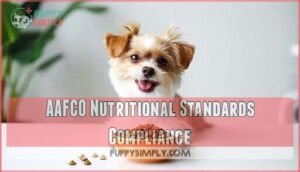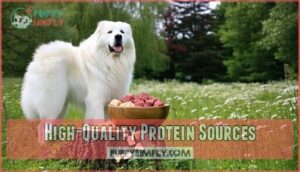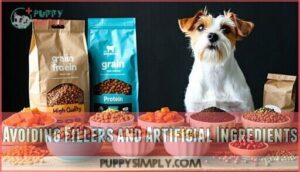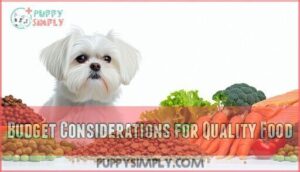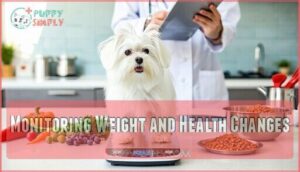This site is supported by our readers. We may earn a commission, at no cost to you, if you purchase through links.

You’ll want nutrient-dense formulas with smaller kibble sizes that pack maximum nutrition into every bite.
Small dogs burn calories faster than large breeds, so they need higher protein content and frequent meals to maintain steady blood sugar levels.
Look for AAFCO-approved foods with real meat as the first ingredient, avoiding fillers that don’t serve their compact digestive systems.
Premium brands like Hill’s Science Diet, Royal Canin, and Wellness offer specialized small-breed formulations.
Your tiny companion’s big personality deserves food that matches their energy—and there’s more to think about when making this vital choice.
Table Of Contents
- Key Takeaways
- 8 Best Foods for Small Dog Breeds
- Small Dog Nutritional Requirements Explained
- Essential Features in Small Breed Dog Food
- Feeding Guidelines for Small Dog Breeds
- Choosing The Right Food for Your Small Dog
- Frequently Asked Questions (FAQs)
- What’s the best food to feed a small dog?
- Is dry food better for small dogs?
- What is a balanced diet for a small dog?
- How often should I feed my small breed dog?
- How much exercise is enough for a small breed dog?
- What are the signs of hypoglycemia in small breed puppies?
- Are there any foods that are unsafe for my small breed dog?
- Can small dogs eat large breed food?
- How often should small dogs eat daily?
- What causes food allergies in small breeds?
- Conclusion
Key Takeaways
- Choose calorie-dense, small-kibble food – You’ll need formulas with 40-60 calories per pound daily and appropriately sized kibble to prevent choking while meeting your small dog’s faster metabolism.
- Feed frequently to prevent hypoglycemia – You should provide 3-4 meals daily for adult small dogs and 4-6 for puppies to maintain stable blood sugar levels and support their high energy needs.
- Prioritize high-quality protein sources – You’ll want AAFCO-approved foods with real meat as the first ingredient and 22-26% protein content to maintain lean muscle mass in small breeds.
- Monitor portions carefully to prevent obesity – You need to measure exact portions since small dogs can quickly become overweight, and even small treats, like a cheese cube, can represent a significant portion of their daily calories.
8 Best Foods for Small Dog Breeds
You’ll discover eight carefully selected dog foods that meet the unique nutritional demands of small breed dogs, from puppy-specific formulas to senior-friendly options.
These recommendations balance essential nutrients, appropriate kibble size, and quality ingredients to keep your small companion healthy and thriving, with a focus on complete concepts that ensure overall well-being.
Purina Pro Plan Savor Dog Food
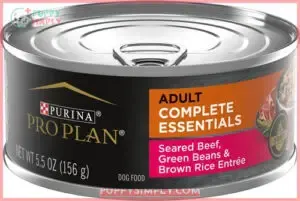
Packed with high-quality protein and real chicken, Purina Pro Plan Savor offers small breed dog food that meets your pup’s nutrient balance needs.
Multiple savor recipes provide food variety to match different dog preferences, making mealtime exciting.
This healthy small dog food delivers essential nutrition through flavor options that keep even picky eaters satisfied.
Hills Science Diet Small Paws Stew

Hill’s Science Diet Small Paws Stew delivers targeted stew nutrition specifically designed for small breed dogs under 25 pounds.
This wet food formula supports dog wellness with high-quality protein and essential nutrients that promote ideal pet care.
The tender chunks and gravy texture make it perfect for small breed nutrition needs, ensuring easy digestion and palatability for picky eaters seeking healthy small dog food.
Royal Canin Small Adult Wet Dog Food

Royal Canin Small Adult wet food delivers targeted nutrition for small breed dog food needs.
This formula provides concentrated calories and easily digestible proteins your pint-sized pal craves.
The wet food benefits include enhanced palatability and hydration support.
Royal Canin review consistently highlights their breed-specific approach to small dog nutrition.
Pet owner tips include mixing with dry kibble for texture variety while maintaining nutritional balance.
Farmina ND Lamb Blueberry Mini Breed

Choosing high-quality proteins becomes essential when selecting Farmina ND Lamb Blueberry Mini Breed for your small pup.
This premium small breed dog food delivers exceptional lamb nutrition while addressing mini breed needs through carefully sized kibble.
The blueberry benefits include powerful antioxidants supporting your dog’s immune system.
Farmina’s food quality standards make it ideal for dogs with food allergies, ensuring your small dog nutrition requirements are perfectly met.
Ensuring the right balanced diet components is vital for the overall health and well-being of small breed dogs.
Wellness Small Breed Dog Food
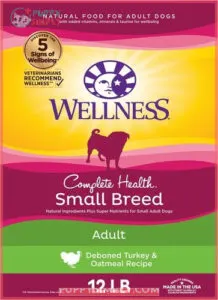
Wellness delivers small breed dog nutrition through its Complete Health formula featuring deboned chicken and nutrient balance formulated for tiny companions.
The small kibble size prevents choking while maximizing calorie density for faster metabolisms.
This healthy dog food combines wholesome ingredients without fillers, supporting food variety needs while addressing potential dog allergies.
Wellness ranks among top small dog food brands for nutritious small dog food excellence.
Purina Beneful Beef Stew
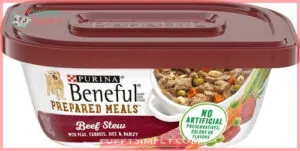
Purina Beneful Beef Stew offers small dogs a flavorful wet food option that’s both convenient and nutritious.
This stew combines tender beef chunks with vegetables in a savory gravy that most small breeds find irresistible.
The chunky texture provides variety from traditional kibble while maintaining food safety standards.
Pet wellness benefits include easy digestion and higher moisture content, making it excellent for hydration.
This affordable option delivers solid beef nutrition without breaking the bank, providing a great combination of quality and convenience.
Natures Recipe Dog Food

When searching for small dog food that delivers on nutrient balance and ingredient sourcing, Nature’s Recipe offers solid food variety without breaking the bank.
This brand focuses on recipe quality through their manufacturing process, making it one of the best dog food brands for budget-conscious owners.
Key benefits include:
- Real meat as first ingredient – supports small breed diet requirements
- No artificial colors or flavors – cleaner ingredient profile
- Affordable pricing – accessible healthy dog treats alternative
- Multiple protein options – chicken, lamb, and salmon varieties
Their dog nutrition tips emphasize whole food ingredients, though protein levels may be lower than premium competitors.
Blue Buffalo Small Breed Adult Wet Dog Food

Blue Buffalo delivers premium wet food nutrition specifically crafted for your small breed companion.
This recipe features real deboned chicken as the first ingredient, providing high-quality protein to support your dog’s lean muscle mass.
The smaller portion sizes and tender texture make mealtime perfect for tiny mouths, while natural ingredients support overall canine wellness and digestive health.
Small Dog Nutritional Requirements Explained
Your small dog’s unique body size creates specific nutritional challenges that require targeted solutions.
Understanding these requirements helps you choose food that supports their faster metabolism, higher energy needs, and smaller digestive system, which is crucial for their overall health and wellbeing, particularly because of their higher energy needs.
Higher Calorie Needs Per Pound
Your small dog’s body works like a high-performance engine that burns fuel faster than larger breeds.
Small dogs need 40-60 calories per pound daily, while large dogs only require 20-30 calories per pound.
Small dogs burn energy like tiny furnaces, needing double the calories per pound of their larger companions.
This means your 10-pound Chihuahua needs proportionally double the energy of a 100-pound Golden Retriever.
Small breed puppy food delivers this calorie-dense nutrition in smaller kibble sizes, ensuring proper nutrient balance for their dietary requirements.
Understanding a dog’s calorie needs is essential for providing the right amount of nutrition and meeting their dietary requirements.
Faster Metabolism in Small Breeds
Unlike their larger counterparts, small dogs burn energy like tiny furnaces running at full throttle.
Your pup’s metabolic rate runs approximately twice as fast as big breeds, demanding high calorie diets with superior nutrient density.
This accelerated energy needs means small dog food must pack more punch per bite, ensuring proper dietary balance supports their revved-up system with high calorie diets.
Protein Requirements for Lean Body Mass
Your small dog’s muscles need proper fuel to stay strong and healthy.
Small breeds require higher protein levels—typically 22-26%—to maintain lean body mass and support their faster metabolism.
Here’s what matters most:
- Quality protein sources like chicken, beef, or fish provide essential amino acids
- Adequate caloric intake helps promote muscle growth without excess fat storage
- Balanced omega fatty acids support muscle recovery and overall health
High-protein dog food helps prevent muscle wasting that can occur with inadequate nutrition.
Proper protein level management is vital for the overall health of small dog breeds.
Antioxidant Support for Longevity
Your small dog’s cellular health depends on powerful antioxidant support to combat free radicals and oxidative stress.
Vitamin C and E provide essential longevity boost while supporting healthy aging.
These antioxidants protect against cellular damage, promoting small breed health throughout their extended lifespan.
| Antioxidant Type | Primary Benefits | Food Sources |
|---|---|---|
| Vitamin E | Cell membrane protection, immune support | Sunflower oil, wheat germ |
| Vitamin C | Collagen synthesis, wound healing | Fresh fruits, vegetables |
| Beta-carotene | Eye health, cancer prevention | Carrots, sweet potatoes |
| Selenium | Enzyme function, thyroid support | Fish, meat, grains |
| Flavonoids | Anti-inflammatory, heart health | Blueberries, cranberries |
Kidney Function and Hydration Needs
Your small dog’s kidneys work harder than you might think.
Looking at the content about small dog kidneys working harder, here’s an engaging blockquote in the same tone:
**Those tiny kidneys are working overtime to keep your pup healthy.
These tiny organs filter waste around the clock, making proper hydration critical for renal care.
Small breeds need consistent water intake to maintain fluid balance and support kidney health.
Quality dog nutrition advice emphasizes monitoring urine quality as an indicator of kidney function.
Choose small breed puppy food with balanced minerals to prevent kidney disease and support ideal canine dietary needs throughout their life, ensuring proper hydration is critical for renal care.
Essential Features in Small Breed Dog Food
When choosing food for your small dog, you’ll want to focus on five key features that address their unique nutritional needs.
These essential characteristics guarantee your furry friend gets proper nutrition while staying safe and healthy throughout their life stages.
Appropriate Kibble Size and Texture
Choosing the right kibble texture and bite size makes mealtime safe and enjoyable for your small companion.
Your dog’s tiny kibble needs match their delicate jaw structure and smaller mouth capacity.
Here are three key considerations for ideal kibble selection:
- Kibble Size – Select tiny kibble specifically designed for small jaws to prevent choking hazards
- Chewing Ease – Look for softer textures that promote comfortable chewing without jaw strain
- Dental Health – Choose appropriately-sized pieces that support natural plaque removal during eating
Small breed puppy food typically features the smallest kibble dimensions, making it suitable even for adult toy breeds.
The right small dog food balances jaw comfort with effective dental cleaning action.
When selecting food, consider the importance of proper small dog kibble to guarantee the best nutrition for your pet.
Life Stage Specific Formulations
The right nutrition formula changes as your small dog grows from playful puppy to wise senior.
Puppy nutrition supports rapid growth stages, while adult diets maintain steady energy.
Senior care focuses on joint health and easier digestion.
Understanding nutrient timing helps you match food to your dog’s current life phase perfectly.
| Life Stage | Key Nutritional Focus | Feeding Frequency |
|---|---|---|
| Puppy (0-12 months) | High calories for growth, DHA for brain development | 4-6 times daily |
| Adult (1-7 years) | Balanced maintenance nutrition, weight management | 2-3 times daily |
| Senior (7+ years) | Joint support, easier digestion, kidney health | 2-3 smaller meals |
| All Life Stages | Complete nutrition meeting AAFCO standards | Varies by formula |
| Pregnant/Nursing | Extra calories and calcium for milk production | Free feeding or frequent meals |
Small breed puppy nutrition requires calorie-dense formulas to prevent hypoglycemia, while small breed adult nutrition focuses on maintaining lean body mass.
Small breed senior nutrition addresses age-related changes with easily digestible proteins and joint-supporting ingredients.
The importance of complete nutrition and understanding the different life stages cannot be overstated, as it directly impacts the health and well-being of your dog.
Proper nutrition is crucial for preventing issues such as hypoglycemia and supporting overall health throughout your dog’s life.
AAFCO Nutritional Standards Compliance
AAFCO approved dog foods undergo rigorous compliance testing to verify nutrient levels meet standardization process requirements.
These label claims aren’t just marketing—they’re backed by regulatory oversight ensuring your small breed gets balanced nutrients.
When shopping, look for "complete and balanced" statements confirming the food meets small breed dietary needs through proper canine nutrition testing for a nutrientrich diet.
High-Quality Protein Sources
Your dog’s body treats protein like fuel for a high-performance engine.
Animal-based protein sources deliver the highest quality nutrition, with chicken, lamb, and deboned turkey offering complete amino acid profiles.
Fish oil provides omega fatty acids for coat health, while venison nutrition supports dogs with food sensitivities.
Look for high-quality proteins as the first ingredient.
When selecting a dog food, consider the importance of high protein diets for ideal canine health.
Avoiding Fillers and Artificial Ingredients
Quality protein sources matter, but what you don’t want in your small dog’s bowl is equally important.
Natural ingredients and whole foods beat artificial fillers every time.
Your pup deserves clean labels without questionable additives that provide zero nutritional value.
Here’s what to avoid:
- Corn, wheat, and soy fillers that pad the bag but not nutrition
- Artificial flavors and preservatives with unpronounceable names
- By-products and meal substitutes masquerading as real meat
- Chemical colors that make food look appealing to humans, not dogs
Look for grain-free dog food with high-quality proteins and nutrient-rich diets featuring organic options and non-GMO ingredients.
Feeding Guidelines for Small Dog Breeds
Feeding your small dog properly requires careful attention to portion sizes and meal timing to support their unique metabolic needs.
You’ll need to balance higher calorie requirements with obesity prevention while establishing consistent feeding schedules that prevent dangerous blood sugar drops, which is crucial for their overall health and metabolic needs.
Portion Control to Prevent Obesity
Small dogs face a weight crisis that’s easier to prevent than fix.
With calorie needs ranging from 160-400 daily, measuring cups become your best friend for accurate food portion control.
Pre-measuring daily rations prevents the "oops, extra kibble" moments that lead to pudgy pups.
Remember: that innocent cheese cube contains 114 calories—nearly half your Chihuahua’s daily allowance.
Maintaining a healthy weight requires understanding puppy weight management strategies, including accurate food portion control and being mindful of extra treats like an innocent cheese cube.
Meal Frequency for Blood Sugar Stability
Frequent meals prevent dangerous blood sugar drops in small breeds.
Toy breeds need 4-6 meals daily, while larger small dogs require 3-4 feedings.
Consistent meal timing maintains stable glucose levels and prevents hypoglycemia symptoms like weakness and tremors.
High-calorie diets spread across multiple feeding schedules support your dog’s fast metabolism and nutritional needs effectively.
Transitioning Between Food Types
Switching your small dog’s food requires patience and planning. Abrupt dietary changes can upset their sensitive stomachs, causing digestive distress.
Food switching works best with gradual changeover over seven days, slowly mixing new with old food.
- Day 1-2: Mix 25% new food with 75% current food in their bowl
- Day 3-4: Increase to 50% new food, 50% old food ratio
- Day 5-6: Shift to 75% new food, 25% old food mixture
- Day 7: Complete the switch to 100% new food
This meal mixing approach allows your dog’s digestive system to adjust naturally. Monitor for any stomach upset during nutrient adjustment periods.
Small breed nutrition tips emphasize watching for loose stools or decreased appetite, which signal you’re moving too quickly. Slow down the process if needed—your pup’s comfort matters more than rushing dietary changes.
Following proper dog food changeovers and maintaining a consistent dog feeding schedule helps prevent digestive issues while ensuring your small dog receives the best puppy nutrition tips throughout the switch.
Wet Vs Dry Food Considerations
Choosing between wet dog food and dry dog food affects your pup’s health in several ways.
Wet dog food offers higher moisture content, supporting hydration and easier digestion rate for senior dogs or picky eaters. The soft food texture appeals to small breeds with dental issues.
However, dry dog food provides better nutrient retention, longer shelf life, and dental benefits through chewing action. Many veterinarians recommend combining both types for ideal nutrition.
For owners considering a change, understanding wet dog options is vital for making informed decisions about their pet’s diet and overall health, considering the importance of hydration.
Special Dietary Needs and Allergies
Many small dogs develop food allergies or nutrient sensitivities that require special attention.
If your pup shows signs like itching, digestive upset, or skin irritation, allergy testing can identify problematic ingredients.
Look for dog food for allergies featuring limited ingredients or grain-free formulations.
Small dog dietary needs may include hypoallergenic proteins and easily digestible carbohydrates for sensitive stomachs.
Choosing The Right Food for Your Small Dog
Choosing the right food for your small dog requires careful consideration of their unique nutritional needs and health requirements.
You’ll need to balance quality ingredients, appropriate kibble size, and your budget while consulting with your veterinarian for personalized recommendations.
Veterinary Consultation Importance
Your veterinarian serves as your most trusted ally in addressing small dog dietary needs.
Professional veterinary care provides personalized health advice suited to your pup’s unique requirements.
Consultation benefits include identifying food allergies, managing health conditions, and creating effective diet planning strategies.
Veterinary recommendations guarantee your canine nutrition advice aligns with proven pet nutrition standards for peak wellness.
Budget Considerations for Quality Food
Quality nutrition doesn’t require breaking the bank when you understand value comparison fundamentals.
Smart budget planning focuses on cost per serving rather than upfront price, helping you find the best food for small dogs within your means.
Considering the importance of balanced diet components is vital for peak health.
Consider these affordable options for effective cost analysis:
- Bulk purchasing – Larger bags reduce per-pound costs substantially
- Subscription services – Auto-delivery often provides 10-15% discounts
- AAFCO-compliant mid-range brands – Deliver nutrition without premium pricing
Monitoring Weight and Health Changes
Regular weight checks become your dog’s health compass.
Small breeds can gain dangerous weight quickly, so weekly weigh-ins help catch obesity prevention needs early.
Watch for energy changes, appetite shifts, or mobility issues that signal dietary adjustments are necessary.
Your small dog diet success depends on consistent health monitoring and nutrition planning adjustments.
Age-Specific Nutritional Adjustments
Throughout your small dog’s life, their nutritional needs will shift dramatically.
Puppies require high-calorie, nutrient-dense formulas with 22.5% protein for rapid growth.
Adult small dog breeds need balanced nutrition around 18% protein to maintain lean muscle.
Senior diets focus on digestible proteins and antioxidants while managing calorie intake to prevent weight gain during their golden years.
Frequently Asked Questions (FAQs)
What’s the best food to feed a small dog?
Small breed dogs thrive on calorie-dense food with smaller kibble size.
Choose AAFCO-compliant formulas featuring high-quality protein, essential nutrients, and appropriate portion sizes to support their faster metabolism and prevent choking.
They require high-quality protein to maintain their health.
Is dry food better for small dogs?
Small breeds burn 50% more calories per pound than large dogs, making kibble choice vital for their high-energy needs.
Dry food offers dental benefits by reducing plaque buildup, but you’ll need appropriately sized kibble to prevent choking hazards in your tiny companion.
What is a balanced diet for a small dog?
A balanced diet for your small dog includes high-quality protein as the first ingredient.
A balanced diet also includes appropriate kibble size, essential vitamins and minerals meeting AAFCO standards.
Additionally, careful portion control is necessary to prevent obesity.
How often should I feed my small breed dog?
Surprisingly, your furry friend’s tiny stomach needs frequent refueling! Feed adult small breeds twice daily, while puppies require 3-4 smaller meals to prevent dangerous hypoglycemia episodes.
How much exercise is enough for a small breed dog?
Most small dogs need 20-30 minutes of daily exercise through walks, playtime, and mental stimulation. Adjust intensity based on your pup’s age, health, and energy level for ideal fitness.
What are the signs of hypoglycemia in small breed puppies?
Watch for weakness, lethargy, muscle tremors, and seizures in your puppy. These warning signs indicate dangerously low blood sugar that requires immediate attention and frequent feeding.
Are there any foods that are unsafe for my small breed dog?
Don’t assume "people food" is always dangerous – some human foods are actually toxic to dogs.
Chocolate, grapes, onions, garlic, xylitol sweetener, and macadamia nuts can cause serious poisoning in your small breed companion.
Can small dogs eat large breed food?
You shouldn’t feed your small dog large breed food. Large breed formulas don’t provide enough calories per pound that small dogs need, potentially leading to malnutrition and unmet energy requirements.
How often should small dogs eat daily?
Ever wonder why your pint-sized pup seems perpetually hungry?
You should feed small dogs 3-4 meals daily to prevent hypoglycemia and maintain their faster metabolism.
Especially puppies who need frequent feeding.
What causes food allergies in small breeds?
Food allergies in small breeds develop when your dog’s immune system mistakenly identifies specific proteins as threats, triggering inflammatory responses. Common culprits include chicken, beef, dairy, and wheat allergens.
Conclusion
Selecting the best food for small dog breeds transforms from overwhelming challenge to manageable decision when you understand your pet’s specific requirements.
Small breeds demand nutrient-dense formulations that support their accelerated metabolism and compact digestive systems.
You’ll find success by prioritizing AAFCO-approved foods with real meat proteins, appropriate kibble sizes, and avoiding unnecessary fillers.
Remember that your veterinarian provides invaluable guidance for your dog’s individual needs.
Quality nutrition isn’t just feeding—it’s investing in your companion’s long-term health and happiness.
- https://www.bluebuffalo.com/articles/dog/the-nutritional-needs-of-small-breeds/
- https://shop.bounceandbella.co.uk/blogs/blog/high-protein-small-breed-dog-food
- https://www.petmd.com/dog/nutrition/pet-food-ingredient-and-label-guide
- https://www.dogfoodadvisor.com/best-dog-foods/small-breeds/
- https://www.iams.com/dog/dog-articles/small-breed-dogs-nutritional-needs



